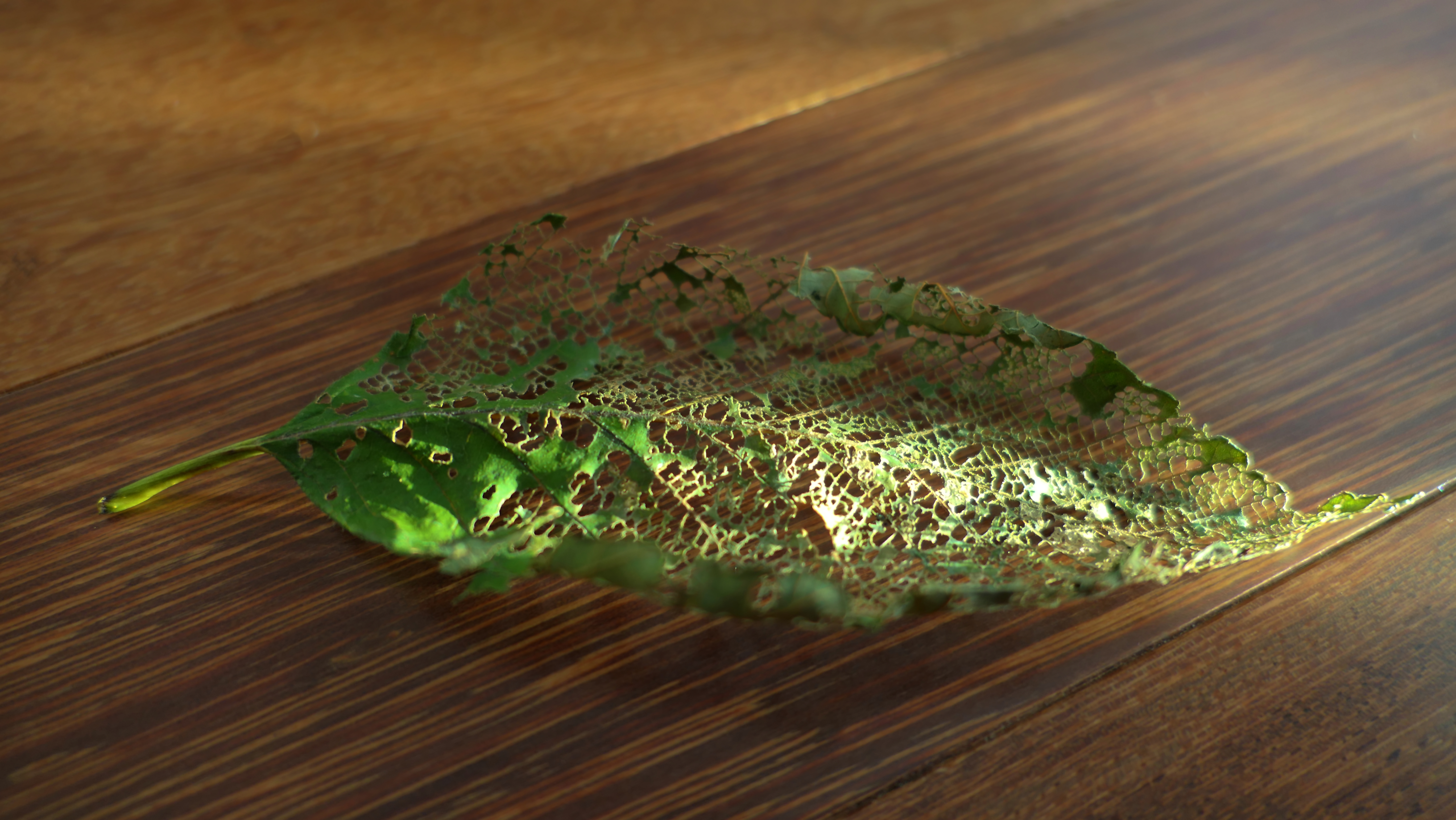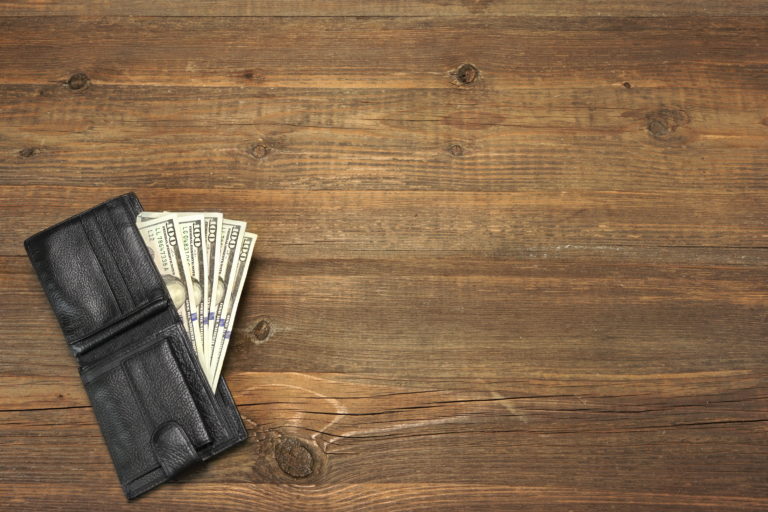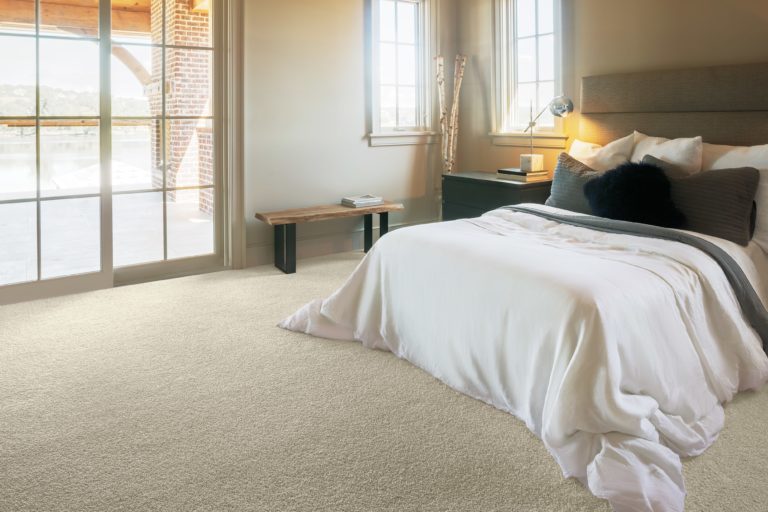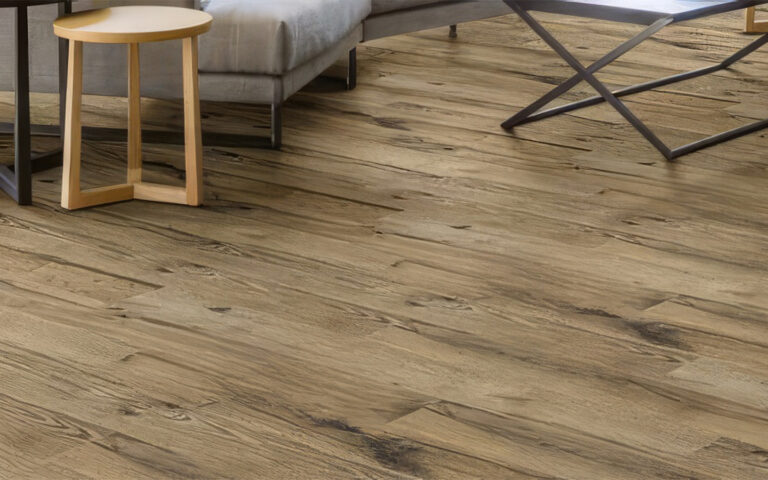This post may contain references or links to products from one or more partners of our parent company and/or subsidiaries of our parent company. For more information, visit this page.
September 29, 2020
Hemp flooring is one of the newest, most innovative types of flooring on the market today—and it only recently became available to consumers! It’s durable, stainable, and we’re 99.9% sure that it’s about to become the next big trend in eco-friendly flooring.
Don’t believe us? Below, we’ll tell you everything you need to know about hemp wood flooring—where it comes from, who makes it, why it’s so amazing, how you can get your hands on it, and more.
The only question you’ll have by the end is: what room should I add hemp flooring to first?
The Basics: What is Hemp Flooring?
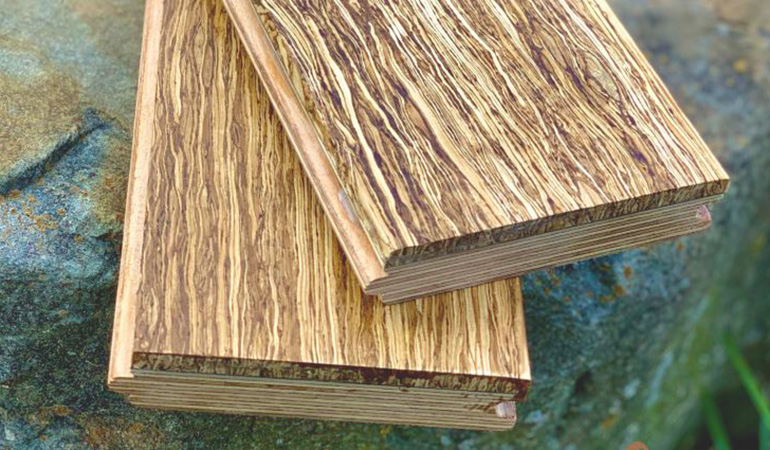
When we talk about hemp flooring, we’re talking about something known as “hemp wood”. This material—also called “hemp hardwood”—is an engineered wood-like product made from compressed hemp plants and a soy-based glue. It’s cuttable, sandable, and stainable, just like regular hardwood. It also grows faster and is better for the environment.
If Hemp Wood Is So Great, Why Are We Only Hearing About it Now?
It wasn’t until December 2018 that farmers could grow hemp plants in the United States. Why? Well, because the hemp plant is part of another plant family with a criminal history—you know the one we’re talking about. Of course, the type of hemp plant used to create hemp wood has less than 0.3% THC and is not the same one used for “greener” pursuits.
Who Makes Hemp Flooring?
A gentleman named Greg Wilson patented the process used to create hemp wood and hemp wood flooring. His Kentucky-based company Fibonacci, LLC makes the only type of hemp flooring available today.
HempWood, the name patented by Wilson, is also used to make skateboards, cutting boards, blocks, and construction materials.
We’ve also seen mentions of Tenessee Wood Flooring Company making hemp wood floors, but we were unable to find any mentions of it on their actual website.
Best Brands of 2024
How is Hemp Wood (aka HempWood) Made?
It takes quite a bit of effort to create hemp flooring. First, farmers harvest raw hemp stalks. These dried stalks then get compressed into five-by-five-inch blocks with a four-foot length. A soy-based binder helps hold the stalks together.
Then, the blocks are sliced into 1/8-inch thick veneers. These veneers are exactly the same as the solid wood veneers used in engineered hardwood flooring. The hemp veneer then gets pressed onto half-inch Russian plywood to create a 5/8-inch-thick engineered flooring.
Finally, a special non-toxic liquid finish is added to protect the surface. But it’s not your typical finish, either. After a nice tan under a UVA and UVB light, this finish cures and solidifies, leaving 99% of the layer intact. The result? A topcoat with an aluminum oxide hardener that’s 25% harder than other hardwood flooring and free from VOCs and formaldehyde. Talk about durable and eco-friendly flooring!
Can I Buy Engineered Hemp Flooring?
Yes—because the only kind of hemp flooring you can buy is engineered! At least according to the company who makes it. Remember: engineered wood is simply a solid wood veneer attached to and durable plywood base. Hemp wood is the exact same—but with a hemp veneer rather than a solid wood veneer.
However, hemp doesn’t even fit into the “engineered” category perfectly. It’s not technically a wood at all, and it doesn’t have a solid hardwood state in the same way that ash flooring or oak flooring does.
Hemp Wood Flooring is Very Similar to Engineered Bamboo Flooring
If you’re familiar with bamboo flooring, then you know more about hemp flooring than you thought. The two are extremely similar, so many of the pros and cons of engineered bamboo apply to hemp flooring as well. Both products are composed of a specialty veneer fixed to a plywood core!
How Do You Install Hemp Flooring?
As one of the newest, most environmentally friendly flooring options on the market, hemp flooring only comes in one style: tongue and groove. No click-together flooring here (yet!).
Unfortunately, tongue-and-groove planks don’t make for the easiest flooring to install, since they have to be glued, nailed, or stapled to your subfloor. And if that immediately makes you think “what is subflooring?”, it’s just the foundation for your finished floor.
If a super-easy installation is what you want, we’d recommend checking out some other flooring options like peel-and-stick carpet tiles (for a softer surface) or snap-together tile flooring (for a harder surface).
Can HempWood Be Installed as a Floating Floor?
Unfortunately, because it doesn’t come in a click-together configuration, you can’t install hemp flooring as a floating floor. That being said, remember that there are some disadvantages of floating floors—so traditional installation isn’t the end of the world.
Installing Hemp Flooring is Just Like Installing Solid Hardwood Flooring
As with solid hardwood flooring, you have endless options when it comes to installing HempWood. So if you already know how to install hardwood floors, the process for installing hemp flooring is nearly identical. You can:
- Fasten hemp flooring to a plywood subfloor or underlayment with nails or staples
- Fasten it to an OSB (oriented strand board) underlayment with nails or staples
- Glue it to a concrete slab subfloor
- Or staple, glue, or nail it to any number of other subfloor and underlayment surfaces
Just remember: gluing HempWood to a concrete slab should be your last resort. Moisture under the concrete can weaken the adhesive, leaving you with a mess. Not to mention, many floor adhesives can be toxic. It just doesn’t make sense to use toxic glue with your nontoxic flooring!
Additionally, if you have a concrete slab subfloor, you might as well opt for a different type of eco-friendly wood-look flooring. Concrete flooring that looks like wood is economical, easy to do, and perfect for basements, patios, and more.
Does HempWood Come Prefinished or Unfinished?
HempWood flooring is available in both prefinished and unfinished styles. Prefinished hemp wood flooring is sanded, sealed, and ready to go. The unfinished product is ready for you to finish with whatever stain and sealer you want.
Can You Stain Hemp Flooring? And Does it Take a Stain Well?
Yes you can (and yes it does)! Stain your unfinished planks any hue you like. You’ll want to choose an oil-based stain, though. Water-based stains can raise the grain, which means you’d have to sand after staining. No one has time for that.
After choosing an oil-based stain, apply one or two coats. The dry time will take longer than it will with hardwoods like oak because hemp is denser, so be patient! Let the stain sit a bit longer until it reaches the wood floor colors you’re after. Wipe off the excess with a rag and you’re good to go.
What Are the Advantages of Hemp Wood Flooring?
Flooring is flooring, right? Wrong. Each type of flooring offers its own unique advantages and disadvantages. In fact, in many ways, hemp compares favorably to products offered by some of the best hardwood floor brands on the market.
Take a look at why we love this new eco-friendly floor:
Hemp is a Rapidly Renewable Resource
Trees take forever to grow. Weeds rapidly grow. And guess what? Hemp is a weed. In fact, hemp is the weed. In as little as 120 days, hemp can grow from a seed to a harvest-ready plant. That’s over 100 times faster than an oak tree grows.
Looking for sustainable hardwood floor alternatives? Hemp wood might be your answer. It’s even more sustainable than Douglas fir flooring and other fast-growing softwoods!
And Hemp Absorbs 4x More Carbon than Trees Do
From an environmental perspective, hemp wood outshines just about all types of wood flooring. Why? Because hemp plants absorb way more carbon than trees do.
One plot of hemp absorbs four times more carbon in its 120-day lifespan than an identical plot filled with trees! Come harvest time, a ton of hemp will have removed a whopping 1.62 tons of carbon from the environment. This is called carbon sequestration, and it’s seriously awesome.
Plus, Hemp Wood is a Seriously Sustainable Material
Hemp wood belongs to a growing family of extremely eco-friendly flooring options. Beyond being a rapidly renewable resource and absorbing carbon, hemp also offers these sustainability features:
- It produces more flooring, per acre, than a forest does (seriously)
- It’s biodegradable
- It returns nutrients to the soil
- Nearly every part of the hemp plant can be used
- It’s a replacement for oak, which is one of the most endangered trees on the planet
If you ask us, hemp flooring has some serious environmentally-friendly cred. If you’re looking for a sustainable wood flooring alternative, it’s a great option.
HempWood Flooring is Naturally Non-Toxic
Hemp wood flooring is 100% non-toxic. You won’t find any formaldehyde, VOCs, or other toxins. It’s made of all-natural hemp stalks, a non-toxic soy-based glue, and a non-toxic liquid finish.
It’s Strong and Durable
Sustainability is great, but can a plant really be as strong as a hardwood? In hemp’s case, it’s actually stronger. Hemp flooring offers exceptional durability that’s comparable to a Brazilian cherry!
Just How Durable is Hemp Flooring?
Exactly how strong is hemp flooring? Super strong. Like, crazy strong. We could go on and on about how durable hemp is, but we’d rather show you with scientific proof using the Janka scale.
What is the Janka Hardness Scale?
If you don’t already know, a wood’s durability is measured using the Janka hardness scale. This chart gives homeowners and builders a simple way to compare the durability of different types of wood. While the world’s most durable wood flooring options can rank at 3500 or above, the industry standard for hardwood is around 1300.
The higher the rating, the harder and more scratch-resistant the wood is.
What’s Hemp Wood’s Janka Rating?
Since hemp wood is so new, it’s not listed on many Janka hardness charts (yet). But the creators of HempWood boast that it has a Janka hardness rating of 2,750. That’s a full 20% harder than hickory!
And, it has a reported density of 60 pounds per cubic foot. In other words, it’s in between Brazilian cherry and Angico on the Janka scale. That’s some seriously hard wood.
Translation: hemp flooring can handle a lot of wear and tear—great news if you have kids or pets at home. It’s the perfect scratch-resistant flooring for high-traffic areas, and it might just be some of the best wood flooring for dogs, too.
Is Hemp Wood Flooring Harder than Oak?
Yep! HempWood is more than twice as hard as oak. Red oak has a Janka rating of 1290; white oak has a Janka rating of 1360. Again, hemp clocks in at about 2,750.
Is Hemp Stronger than Wood?
Again, yes—hemp is stronger than most wood species. The list of woods and flooring that rank below hemp wood on the Janka scale includes hard maple, yellow birch, black walnut, teak flooring, Douglas fir, pine flooring, Australian cypress… the list goes on.
Is Hemp Wood Flooring Stronger than Bamboo Flooring?
In some applications, hemp is stronger than bamboo—but not always when it comes to flooring. Some of the best bamboo flooring—like non-carbonized strand woven bamboo—can sport a Janka rating of 3000 or higher. Charts put strand bamboo at the top of the Janka scale next to strand eucalyptus. That said, both are excellent sustainable flooring options that can be used to help reduce your home’s carbon footprint.
Is Hemp Flooring Waterproof?
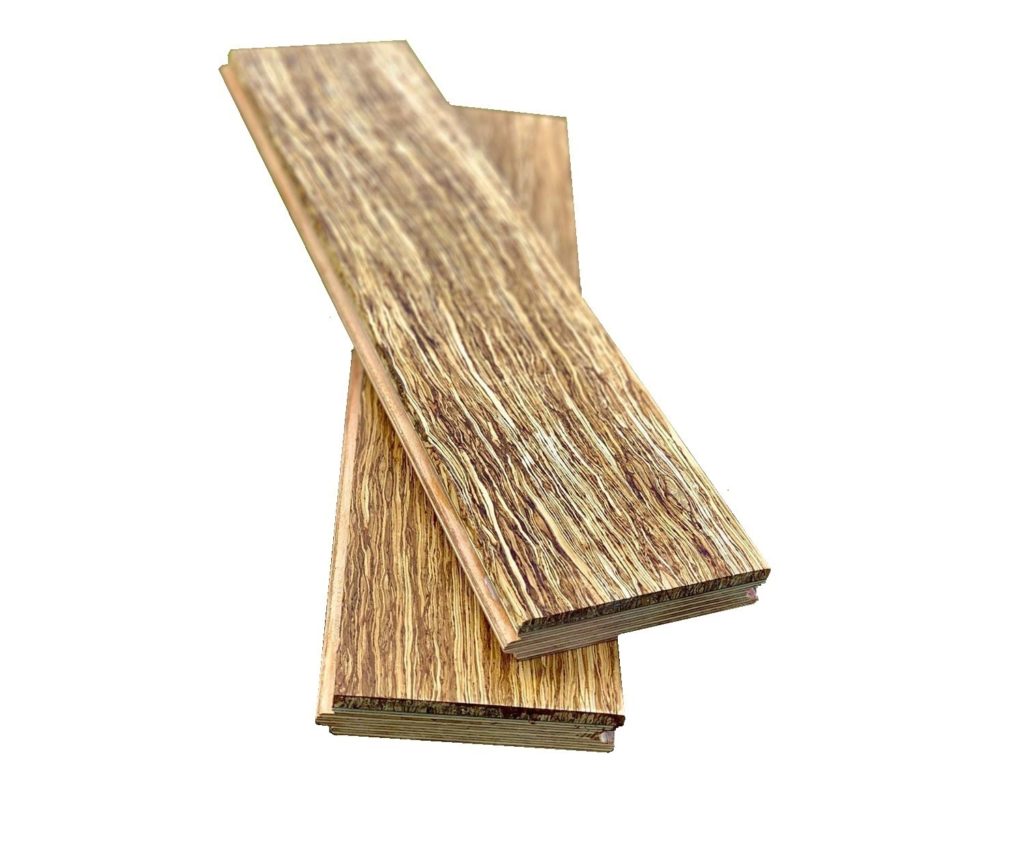
Compared to some hardwoods, HempWood is a reasonably water-resistant wood flooring option. That being said, like most types of wood flooring, it is not fully waterproof. It’s made of natural materials that can bend and warp, and the last thing you want to do is ruin your beautiful hemp floors with an errant spill.
Remember: even the best engineered wood flooring isn’t fully waterproof. If your home lets water in—or if your plumbing is prone to leakage—you may want to look into different types of tile instead.
Hemp could still work in a kitchen or as sunroom flooring, but maybe visit the tile vs. laminate debate for your wood floor bathroom or mudroom flooring needs. And if waterproof qualities are an absolute must, think about going with a specialty waterproof product like Mohawk’s RevWood flooring instead.
Where Can You Buy Hemp Wood Flooring?
HempWood flooring became available for consumer purchase in the summer of 2020. You can buy it directly from Fibonacci LLC At HempWood.com. Right now, you can purchase a flooring sample online for $1. That includes a prefinished and unfinished piece. For larger orders, you’ll need to give them a call.
How Much Does Hemp Flooring Cost?
Right now, unfinished HempWood flooring costs $9.99 per square foot. This keeps it cost-competitive with black walnut. Adding a UV cured topcoat (which we would always recommend) brings the total to $10.99 per square foot. Products available right now have a clear matte finish, but expect to see other stain colors in the future as hemp flooring takes off.
Just remember: your total wood flooring cost will almost exceed your square footage. Think of it this way: the actual cost to replace carpet with hardwood includes removal, disposal, and installation materials, so all of those elements need to be factored in when you price out your new hemp flooring. And of course, if you aren’t into DIY wood floors, you’ll have to pay for installation too.
In any case, if you’ve completed do-it-yourself flooring projects in the past and are familiar with the cost to install engineered hardwood floors, you’ll find that the price to install hemp floors is relatively similar. The labor can be a little more intensive, though, since hemp wood is harder to cut and sand than most hardwoods are.
So: Does Hemp Wood Flooring Live Up to All the Hype?
It’s natural to be wary of a new product like hemp wood flooring. But there’s nothing new about using hemp as a building material. And there’s certainly nothing new about using fake wood flooring to increase durability and lower price! But, since HempWood is new, there isn’t much information out there yet about how customers like it.
What we do know is this: hemp flooring may just change the flooring industry as we know it. The raw materials grow incredibly quickly, the finished product outperforms oak, and it’s incredibly sustainable.
Aside from the engineered wood disadvantages you would find in any engineered product, hemp flooring doesn’t really have any real downsides. And because you can install it just like solid wood, it’s easy to use it for trendy wood floor patterns like chevron parquet or herringbone.
All in all, we think hemp flooring is pretty darn fantastic. And now that you have all the info you need to compare hemp to other flooring options, find a flooring store in your area to get started! Local flooring retailers are the best resource around for answering questions and guiding you through your floor buying journey.
Want more info on all things flooring? Check out:
About The Author

Sarah Goldy-Brown
September 29, 2020
Sarah is a seasoned freelance writer from the Harrisburg, Pennsylvania area who specializes in producing well-researched, meaningful content for her myriad of clients. In her free time, she enjoys reading memoirs, doing puzzles, going for walks, and completing small DIY projects.
